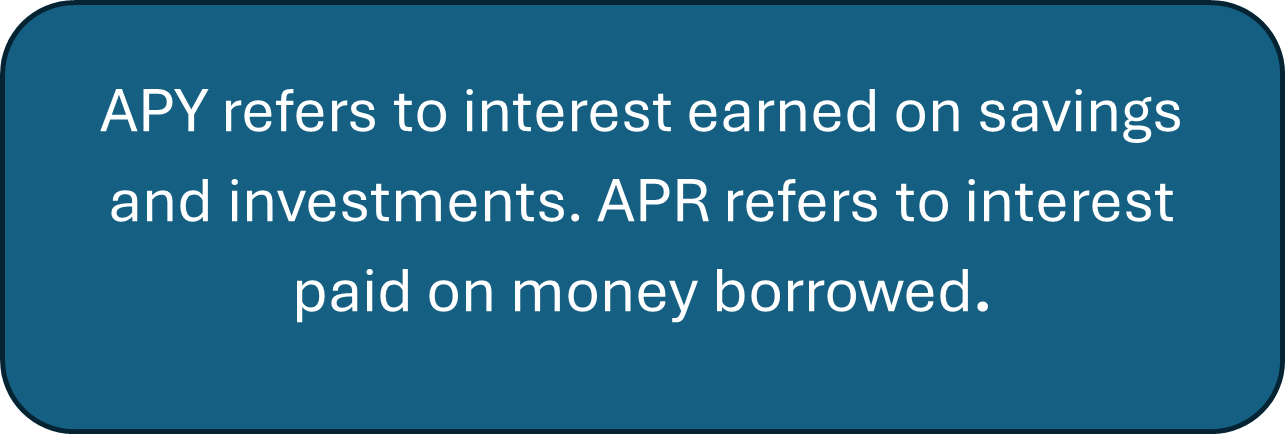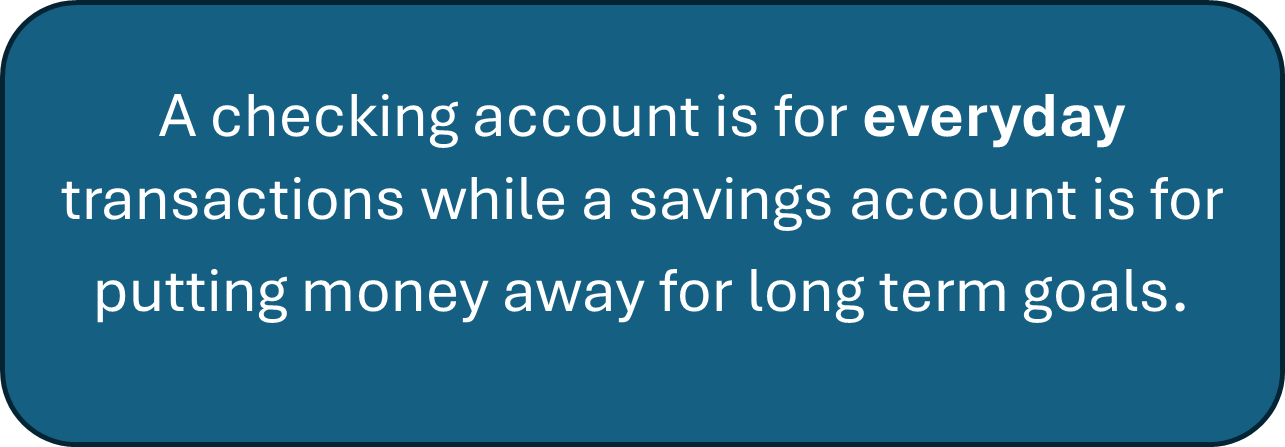September 10, 2024
5 Basic Banking Concepts Every 20-Something Should Know

To most 20-somethings, banking and personal finance can be confusing, maybe even a little intimidating. There is a direct correlation between financial literacy and financial peace of mind. By familiarizing yourself with basic financial concepts and other banking terminology, you’ll have the tools you need to take charge of your financial wellbeing. Listed below are five terms and products that you will encounter throughout your financial journey over the rest of your life.
- APY vs APR
 Annual Percentage Yield (APY) is the rate of interest earned per year on savings or an investment, including compound interest. A higher APY equates to higher returns on investment. Annual Percentage Rate (APR) is interest you must pay on a loan per year. A higher APR equates to more money paid on a loan in total. APR can apply to your credit card, mortgage, line of credit and more.
Annual Percentage Yield (APY) is the rate of interest earned per year on savings or an investment, including compound interest. A higher APY equates to higher returns on investment. Annual Percentage Rate (APR) is interest you must pay on a loan per year. A higher APR equates to more money paid on a loan in total. APR can apply to your credit card, mortgage, line of credit and more.
- Checking Account vs Savings Account
 A checking account is an everyday account that typically earns low or no interest and allows the holder to make unlimited transactions. Checking accounts are best utilized for paycheck deposits, bill paying and other day-to-day expenses. Savings accounts generally earn better interest than checking and are intended for setting aside money for emergencies, opportunities, or longer-term goals. Both of these account types are FDIC-insured. Learn more about Cape Cod 5's account offerings.
A checking account is an everyday account that typically earns low or no interest and allows the holder to make unlimited transactions. Checking accounts are best utilized for paycheck deposits, bill paying and other day-to-day expenses. Savings accounts generally earn better interest than checking and are intended for setting aside money for emergencies, opportunities, or longer-term goals. Both of these account types are FDIC-insured. Learn more about Cape Cod 5's account offerings.
- CD Account
A CD, or certificate of deposit, is an FDIC-insured savings account that comes with a fixed APY. However, unlike regular savings accounts, CD funds cannot be accessed for a pre-determined duration of time without a financial penalty. If you know you won’t need the funds for a certain period of time, a CD is an easy, lower-risk way to earn interest. Learn more about Cape Cod 5’s CD offerings.
- FDIC Insurance
 The FDIC (Federal Deposit Insurance Corporation) is an independent government agency designed to secure bank funds in the unlikely event of a bank failure. If a bank is FDIC-insured, checking, savings, money market and CD accounts are insured up to $250,000 per depositor per ownership category. FDIC insurance does not apply to stocks and bonds (or other investment instruments) even if they are opened by the investment arm of a bank. Some banks, like Cape Cod 5, offer additional options for FDIC protection on 100% of your deposits. Learn more details about how accounts are insured.
The FDIC (Federal Deposit Insurance Corporation) is an independent government agency designed to secure bank funds in the unlikely event of a bank failure. If a bank is FDIC-insured, checking, savings, money market and CD accounts are insured up to $250,000 per depositor per ownership category. FDIC insurance does not apply to stocks and bonds (or other investment instruments) even if they are opened by the investment arm of a bank. Some banks, like Cape Cod 5, offer additional options for FDIC protection on 100% of your deposits. Learn more details about how accounts are insured.
- Money Market Account
A money market account (MMA or MMDA) is an interest-earning bank account. Best thought of as a cross between a checking and savings account, an MMA earns interest rates closer to a savings account but still includes limited debit card and check writing privileges. While a Money Market Account has a higher minimum balance requirement than other types of interest-earning accounts, many consumers prefer its flexibility and potential for interest earned. For more information, see Cape Cod 5’s MMA offerings.
Financial literacy is critical for financial wellness, which is important to our overall happiness. Setting aside 15-30 minutes per week to continue working on your personal finances is a small investment that will compound over time. Review your income, track your spending and read more articles from our library. You’ll feel far more comfortable in no time!

